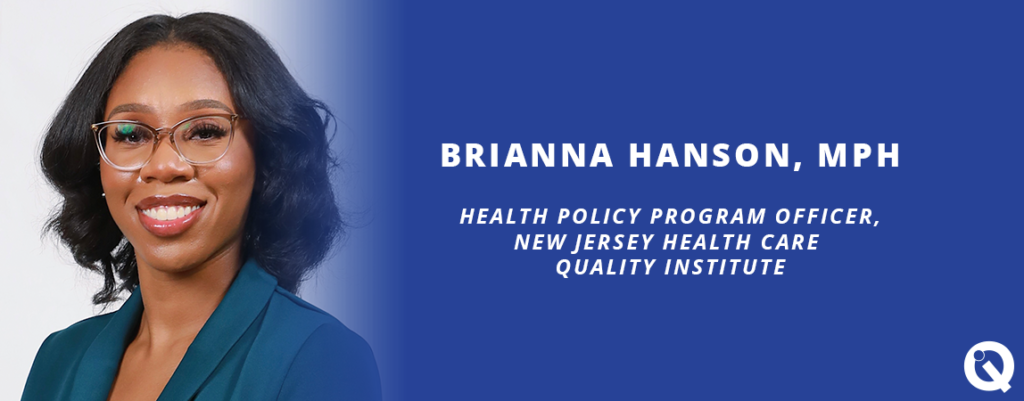Brianna Hanson, MPH, Health Policy Program Officer, the Quality Institute.
You recently joined the Quality Institute. Can you tell us what you will be doing for our organization?
My focus will be health care policy, and among my first initiatives will be to focus on maternal-child health policy. We know that unacceptable racial disparities exist in New Jersey, where Black, Non-Hispanic women had approximately seven times more pregnancy-related deaths than white women. I’ll focus on moving the Maternity Action Plan (MAP) forward and supporting key community organizations and advocates in outreach to galvanize and engage leaders, decision-makers, and action-oriented organizations.
Please tell us about your experience and how your background will inform your work at the Quality Institute?
Perhaps I should first talk about my own lived experience. I have seen barriers in health care firsthand … whether cost, understanding, or even the ability to feel comfortable in the health care space. All those things stop people from getting the health care they need.
And then there is my skillset, which will be relevant. I worked in a level 1 trauma center doing access management in the emergency department. I can’t tell you how many times people would ask me, ‘What is this going to cost?’ And I could not tell them. It was gratifying when I ran someone’s name and found they were enrolled in Medicaid, and they didn’t know it. I could say, “Now, here’s your Medicaid number. Take this and you can go to the doctor.”
I also worked as a research intern in an organization fighting to end poverty; worked on a database of health services for human trafficking victims and survivors; and was resident mentor for incoming freshmen as part of the Educational Opportunity Fund. And I earned a Master of Public Health, Health Systems and Policy, from Rutgers University.
How does health equity play a key role in your focus on policy?
Health equity will always be at the forefront of my mind, like, “How can this program expand to populations who aren’t heard?” That’s why I chose to get into health policy — to be a voice and advocate for the populations whose voices you don’t always hear — whether because they’re just so niche and small, or just because they’re not afforded the same opportunity to be at the table. I will work to make sure that when I am looking at the different projects and maybe policies and recommendations, we’re considering the diverse populations of New Jersey and we’re being inclusive.
What lesson did you learn from your public health work in New York State that you’d like to share?
I worked on New York State Wastewater Surveillance Network as an epidemiologist surveilling SARS-CoV-2, monkeypox, and poliovirus in the NYC Metro Region. I learned, “If you want to get far, do it together.” Through partnership with the Department of Health and other institutes in the state, Syracuse University turned a small pilot on campus into a network that now covers millions of people. I saw the importance of partnering with various sectors, such as academia, government, business, etc., to be effective.
Can you tell us a little bit about you outside of your professional life?
Photography is a hobby of mine. I recently traded in my Nikon for a Sony. I like to take pictures of landscapes, food, or anything else that excites me. Going outside and taking pictures of nature, that’s something I love to do. And I’m part of the Yelp Elite Squad, which is a group that allows me to attend exclusive complimentary events while networking with other foodies and explorers.

